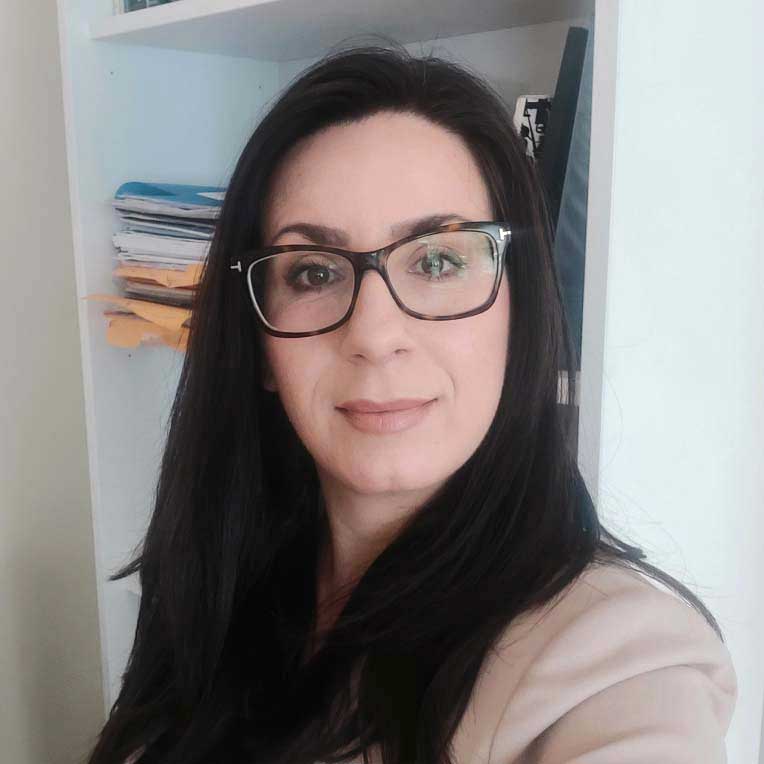Elena Barbieri
Elena Barbieri earned the Toffler Scholar Award in 2023 at Northwestern University
Biography
Elena Barbieri was born in Milan, Italy, and grew up in a small town just outside the city. Dr. Barbieri’s parents encouraged her to pursue her education, and she was the first person in her extended family to go to college.
As a child, Dr. Barbieri had a variety of interests. She loved art and really enjoyed visiting museums and other cultural sites around her home. She also did ballet. In high school, her favorite subjects were literature and language. But through it all, she was fascinated by medicine. When a pediatrician came to visit her at home, she remembers saying that she was going to be like him one day.
Dr. Barbieri attended a high school that prepared her for secondary education. At graduation, she knew she wanted to support other people, so she chose psychology as her undergraduate degree. While completing her degree, she attended a lecture on aphasia, which is when an individual loses the ability to speak — often due to a stroke or neurodegenerative disease. That lecture changed the course of Dr. Barbieri’s career.
She decided to pursue a Master’s degree in clinical neuropsychology, specifically selecting a curriculum centered on language disorders like aphasia — an area of study that bridged her interests in medicine and language. After earning her Master’s degree, Dr. Barbieri knew she wanted to pursue research as a career. She was accepted to the Psychology and Cognitive

Neuroscience program at the University of Milano-Bicocca, where she completed a brief exchange at Northwestern in the United States. She earned her Ph.D. in 2012.
After obtaining her Ph.D., Dr. Barbieri returned to Northwestern as a postdoctoral fellow, then continued on as a research associate. Today, she is a Senior Clinical Research Associate in the Cognitive Neurology and Alzheimer's Disease Center at Northwestern University. She researches the areas of the brain that are responsible for language difficulties in patients with aphasia, an acquired language disorders resulting from stroke or neurodegenerative disease.
“I have always been interested in medicine. One day a pediatrician came to visit me at home, and I remember saying, ‘I am going to be like him one day.’”
– Dr. Elena Barbieri

Biography
Elena Barbieri was born in Milan, Italy, and grew up in a small town just outside the city. Dr. Barbieri’s parents encouraged her to pursue her education, and she was the first person in her extended family to go to college.
As a child, Dr. Barbieri had a variety of interests. She loved art and really enjoyed visiting museums and other cultural sites around her home. She also did ballet. In high school, her favorite subjects were literature and language. But through it all, she was fascinated by medicine. When a pediatrician came to visit her at home, she remembers saying that she was going to be like him one day.
Dr. Barbieri attended a high school that prepared her for secondary education. At graduation, she knew she wanted to support other people, so she chose psychology as her undergraduate degree. While completing her degree, she attended a lecture on aphasia, which is when an individual loses the ability to speak — often due to a stroke or neurodegenerative disease. That lecture changed the course of Dr. Barbieri’s career.
She decided to pursue a Master’s degree in clinical neuropsychology, specifically selecting a curriculum centered on language disorders like aphasia — an area of study that bridged her interests in medicine and language. After earning her Master’s degree, Dr. Barbieri knew she wanted to pursue research as a career. She was accepted to the Psychology and Cognitive Neuroscience program at the University of Milano-Bicocca, where she completed a brief exchange at Northwestern in the United States. She earned her Ph.D. in 2012.
After obtaining her Ph.D., Dr. Barbieri returned to Northwestern as a postdoctoral fellow, then continued on as a research associate. Today, she is a Senior Clinical Research Associate in the Cognitive Neurology and Alzheimer's Disease Center at Northwestern University. She researches the areas of the brain that are responsible for language difficulties in patients with aphasia, an acquired language disorder resulting from stroke or neurodegenerative disease.
“I have always been interested in medicine. One day a pediatrician came to visit me at home, and I remember saying, ‘I am going to be like him one day.’”
– Dr. Elena Barbieri

Research Focus
Challenges
Aphasia is a loss of the ability to understand or express speech. Although aphasia affects a person’s language comprehension and use, it does not impact their cognitive function. People living with aphasia can think, drive a car, and use non-verbal reasoning. But language is so central to what we are and what we do every day that most people cannot continue to participate in many areas of their lives — like work.
There is no pharmacological treatment for aphasia. Speech therapy is effective, but there is a wide range of variability between patients. A lot of research goes into determining what type of speech therapy to prescribe a patient, how frequent their sessions should be, and if their therapy should be combined with non-invasive brain stimulation.
Focus and Priorities
Dr. Barbieri is working to better characterize Primary Progressive Aphasia (PPA). Specifically, she is trying to understand how different brain pathologies relate to the progression of the disease and to the type of language difficulties exhibited by patients. PPA can be caused by different proteins accumulating in the brain: β-amyloid, tau, and transactive response DNA binding protein of 43 kDA (TDP-43). A buildup of any of these proteins is associated with atrophy (i.e., with loss of brain cells), and underlie not only PPA, but also other diseases, such as Alzheimer’s Disease.
Focus and Priorities
Dr. Barbieri is working to better characterize Primary Progressive Aphasia (PPA). Specifically, she is trying to understand how different brain pathologies relate to the progression of the disease and to the type of language difficulties exhibited by patients. PPA can be caused by different proteins accumulating in the brain: β-amyloid, tau, and transactive response DNA binding protein of 43 kDA (TDP-43). A buildup of any of these proteins is associated with atrophy (i.e., with loss of brain cells), and underlie not only PPA, but also other diseases, such as Alzheimer’s Disease.
PPA can also progress differently for each patient, and the underlying pathology may affect the disease progression, as well as the available treatment options. Dr. Barbieri is looking at differences in the language profiles of individuals with PPA to see if there is a correlation between the pathology (e.g., Tau vs. TDP-43) someone has and the specific way their aphasia manifests. This knowledge would help physicians determine the best course of treatment for a patient.
PPA can also progress differently for each patient, and the underlying pathology may affect the disease progression, as well as the available treatment options. Dr. Barbieri is looking at differences in the language profiles of individuals with PPA to see if there is a correlation between the pathology (e.g., Tau vs. TDP-43) someone has and the specific way their aphasia manifests. This knowledge would help physicians determine the best course of treatment for a patient.
Benefits
If Dr. Barbieri can determine the specific language patterns associated with different types of PPA, her research can help clinicians find the best treatment options for patients with this disease — ultimately improving their quality of life.
Karen Toffler Charitable Trust Investment
Dr. Elena Barbieri plans to use funding from The Karen Toffler Charitable Trust to create a new testing protocol that doesn’t rely on voice or movement to determine the type and impact of aphasia.
Over time, testing patients with PPA becomes more difficult. Many patients eventually cannot speak at all, so they’re unable to take standard language tests. And because their verbal language comprehension is also impacted, tests where they are asked to point to specific words or pictures also become difficult.
Dr. Barbieri plans to develop three different tests that do not rely on an overt response. Instead, the tests track eye movements. Eye movements are predominantly automated neurological responses. For example, when a person with normal cognitive function hears the word “ball,” they automatically look at the picture of a ball. Their eyes will also automatically look at related words (like hearing the word “tomato” would make them look at an image of a cucumber) or words that represent objects which have a similar form or shape (like looking at a red ball when they hear the word “radish”).
Dr. Barbieri is designing tests that enable researchers to gain insights into what is going on in a patient’s brain without relying on verbal responses or pointing. This form of testing allows Dr. Barbieri to investigate what kind of deficits people with different types of pathology have. For example, if they're more distracted by an object that is part of the same category (a cucumber vs. a tomato) instead of a word that sounds the same (deer vs. beer), that will give her critical insights into how the patient’s understanding of language is breaking down.
This data will ultimately help researchers not only characterize the different types of aphasia based on pathology, but also help them design better language treatments that are focused on the specific areas where patients need more support.
Karen Toffler Charitable Trust Investment
Dr. Elena Barbieri plans to use funding from The Karen Toffler Charitable Trust to create a new testing protocol that doesn’t rely on voice or movement to determine the type and impact of aphasia.
Over time, testing patients with PPA becomes more difficult. Many patients eventually cannot speak at all, so they’re unable to take standard language tests. And because their verbal language comprehension is also impacted, tests where they are asked to point to specific words or pictures also become difficult.
Dr. Barbieri plans to develop three different tests that do not rely on an overt response. Instead, the tests track eye movements. Eye movements are predominantly automated neurological responses. For example, when a person with normal cognitive function hears the word “ball,” they automatically look at the picture of a ball. Their eyes will also automatically look at related words (like hearing the word “tomato” would make them look at an image of a cucumber) or words that represent objects which have a similar form or shape (like looking at a red ball when they hear the word “radish”).
Dr. Barbieri is designing tests that enable researchers to gain insights into what is going on in a patient’s brain without relying on verbal responses or pointing. This form of testing allows Dr. Barbieri to investigate what kind of deficits people with different types of pathology have. For example, if they're more distracted by an object that is part of the same category (a cucumber vs. a tomato) instead of a word that sounds the same (deer vs. beer), that will give her critical insights into how the patient’s understanding of language is breaking down.
This data will ultimately help researchers not only characterize the different types of aphasia based on pathology, but also help them design better language treatments that are focused on the specific areas where patients need more support.
“I have always really liked the idea of having a career centered on knowing how people feel and knowing how to help them feel better.”
– Dr. Elena Barbieri